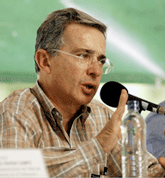AS/COA Online | Lula Unveils Major Infrastructure Investment Plan
/In a move that could bolster the electoral chances of his chosen political heir, Brazilian President Luiz Inácio Lula da Silva announced a massive infrastructure investment program this week. The plan—valued at roughly $880 billion—will be the second stage of the Growth Acceleration Program and is known by its Portuguese acronym as PAC 2. Lula unveiled the plan at a meeting with 1,200 people and his hoped-for successor Dilma Rousseff in attendance. Rousseff’s administration would carry out the project should she win the October elections. She steps down from her post as Lula’s chief of staff this week to focus on the race as the governing Workers’ Party candidate. But even though Lula’s approval rating has hit a record 76 percent, Rousseff trails São Paulo Governor José Serra in electoral polling.






